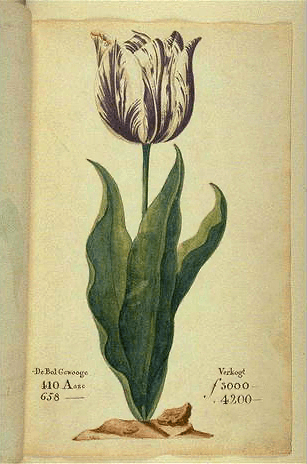
As bitcoin surges past $5,500, Christopher Jackson looks at what art can tell us about periods of intense speculation
Consider this image: it is, of course, a tulip. There’s nothing astonishing about that – we encounter them regularly at this time of year.
But this is a special tulip, which formed part of Pieter Cos’ famous 1637 catalogue at the height of the so-called Tulip Mania in Holland: historians’ favourite example of a so-called ‘bubble’.
Is there anything in the drawing to suggest the ‘mania’ which we now know to have been circulating at this time around this particular flower?
The flower itself, stately and groping plausibly towards the light, is drawn calmly, and without any evidence that the painter in question has gone especially mad.
But the numbers on the right-hand side of the image suggest that someone somewhere has: the tulip in question is offered for sale between 3,000 and 4,200 guilders, around ten times the salary of the typical skilled worker at the time.
And of course, we all know what happened from there – the great crash, the money never to be recouped, great embarrassment all round. Why does it matter now? Well, we have our own potential tulip mania today in the shape of bitcoin.
And intriguingly, we have comparable artworks cropping up here and there with the strange, and probably unlovely, fad of bitcoin sculptures.
This year, bitcoin has been rather quiet. But there are signs that the second half of the year may see a rally and, from there, another year of headlines. It’s an opportune moment then to consider what artworks can tell us about our speculative side.
The most noteworthy of these was commissioned on the banks of the Thames by Eidoo, a cryptocurrency wallet and exchange company: the sculpture, a magnificently absurd bronze affair, shows a pregnant woman with a baby in her womb holding a smartphone. It is an image of a future that many parents who don’t remember an iPhone 6 at the birth scene will find dispiriting.
Count Tolstoy always used to say, ‘When you hear someone say ‘Nowadays…’ prepare to hear a lie’. We are more anchored to the past than we realise. Eidoo’s bitcoin sculpture draws on one of the oldest forms of iconography: the pregnant woman.

And when recently another exchange QuadrigaCX – all crypto businesses are named with maximum ugliness – announced that it was unable for encryption reasons to access $190 million in bitcoin after founder Gerald Cotton died suddenly at 30, I didn’t understand the ins and outs, but it sounded like a good beginning to an Agatha Christie.
The past keeps impinging on all our clever inventions; human nature is gloriously stubborn. Last year, Goldman Sachs noted that the volatility in bitcoin was far worse than our worst fears: ‘Cryptocurrencies have moved beyond bubble levels in financial markets, and even beyond the levels seen during the Dutch ‘tulipmania’ between 1634 and early 1637’, it said in a report.
It was a slap on the wrist for that ancient human wish: to make a killing while doing nothing at all.
Who’s to say they’re wrong? One person who would certainly disagree is Iqbal Gandham, the frighteningly bright CEO of another alarmingly named platform eToro. ‘I feel economic theory has developed so much in the past 400 years,’ he tells me, regarding the tulip mania-bitcoin analogy. ‘We cannot keep referencing what happened then as an example of what may happen today.’
Gandham also explains how what is going on in bitcoin – its price is famously volatile – has had no ripple effects across the economy, as happened both during tulip fever, and in the so-called dotcom bubble in 2000. ‘Valuations of companies at an early stage are all based on speculation, as they grow this moves to utilisation. The same will happen to bitcoin,’ he explains.
But most wealth managers and banks still express scepticism – although it is true that they usually do so having just announced that they don’t fully understand cryptocurrency.
The likeable CEO of Investment Quorum, Petronella West, is in that category: ‘We’re mainstream and it’s pretty esoteric: you need a fair whack of research and analysts to get it right,’ she says. She adds: ‘We had one client who wanted to buy it: we found access to it. The only way we think is through a multi-strategy fund – but it’s not part of our mainstream portfolio.’
So it can be done but most wealth managers are more likely to frown and talk about tulips. Is there any middle ground?
Perhaps. Alan Miller, the CEO of SCM Direct tells me: ‘In a nutshell, I’m not anti the general idea because anything that can intermediate banks and take out the excess costs and charges that banks rip out from the average person I’m all in favour of. I’m not an old dinosaur who doesn’t want anything new.’
Both works of art – the tulip and the Eidoo sculpture – contain something of this contradiction. On the one hand there is the wish to find one’s life suddenly bettered by unexpected wealth. This makes one entertain, and even hanker after, the new.
On the other is the fear that in looking for such rapid enhancement, we may lose everything – and that we were better off where we were before.
Spear’s tends towards caution. Our readers – like Petronella West’s clients – have made their money. And in any case, it’s possible today to be on a teacher’s salary and still live a life more comfortable in most respects than the life of Louis XV.
It was Voltaire who in his most famous novel Candide has the eponymous hero conclude that he is better off ‘tending his own garden.’ Voltaire was no stranger to speculation himself – but perhaps best not to plant tulips right now. There’s something twitchy in the air.
Christopher Jackson is deputy editor of Spear’s







